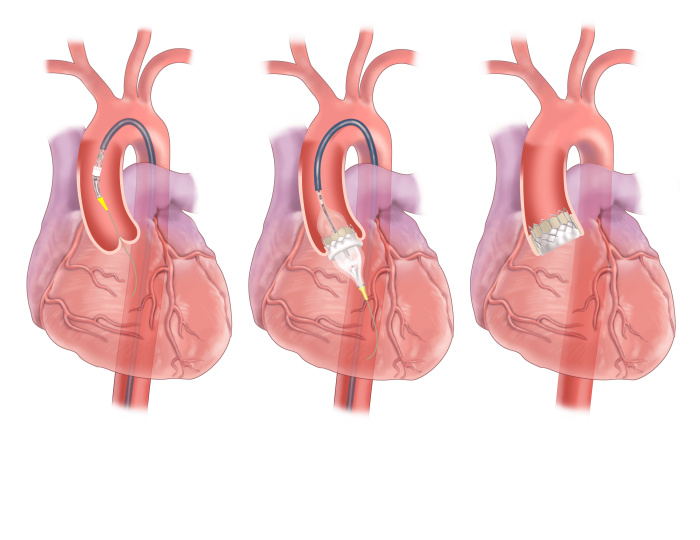Following Transcatheter Aortic Valve Replacement (TAVR), maintaining stable blood pressure and heart function is crucial for a successful recovery and long-term heart health. TAVR restores blood flow through the heart, but the sudden improvement in valve function can lead to changes in blood pressure that need careful monitoring. Effective management of blood pressure and heart function is essential to reduce complications, support the healing process, and ensure that the new valve functions optimally.
Medical disclaimer: This content is for general awareness and does not replace a doctor’s consultation. For diagnosis or treatment decisions, consult a qualified specialist.
Understanding Blood Pressure Changes After TAVR Surgery
After TAVR, many patients experience shifts in blood pressure, as the heart adjusts to improved blood flow through the newly replaced valve. Some may see a reduction in blood pressure, especially if the valve replacement alleviates previous strain on the heart. However, others may encounter fluctuations in blood pressure levels, which require careful monitoring to avoid complications such as dizziness, heart strain, or damage to other organs. Stabilizing blood pressure in the weeks following surgery is critical to support the heart's adjustment and prevent further health issues.
How TAVR Impacts Heart Function: What to Expect
The TAVR procedure can significantly enhance heart function by allowing blood to flow more freely through the aortic valve, reducing strain on the heart and improving overall cardiac output. This boost in heart performance is beneficial, but it also requires the body to adapt to new circulation patterns. Patients may notice an improvement in symptoms like shortness of breath or fatigue, but in some cases, medications may be necessary to manage the new hemodynamics. Regular checkups allow physicians to assess heart function changes and adjust care as needed.

Common Medications for Blood Pressure Control After TAVR
After TAVR, many patients are prescribed blood pressure medications to help maintain stable blood pressure and protect the heart. ACE inhibitors, angiotensin II receptor blockers (ARBs), and calcium channel blockers are commonly used to manage blood pressure levels. These medications work to relax blood vessels, decrease fluid retention, and reduce the heart's workload, supporting the improved function gained from the TAVR procedure. Each patient's medication plan is individualized based on their unique needs and response to the surgery.
The Role of Beta-Blockers in Supporting Heart Health Post-TAVR
Beta-blockers play an essential role in managing heart rate and blood pressure for patients post-TAVR. These medications help control heart rate, prevent arrhythmias, and reduce the risk of heart-related complications by reducing the heart's demand for oxygen. Beta-blockers also assist in maintaining lower blood pressure levels, which is crucial for long-term heart health. Patients may be prescribed beta-blockers, especially if they have a history of high blood pressure or arrhythmias before the procedure.
Managing Hypertension and Hypotension After TAVR
Blood pressure management after TAVR requires a balanced approach, as both hypertension (high blood pressure) and hypotension (low blood pressure) can pose risks. Hypertension can increase the risk of complications like stroke, while hypotension can lead to symptoms like dizziness or fainting. Physicians monitor blood pressure closely after TAVR and adjust medications as needed to maintain optimal levels, helping the heart adapt to the improved valve function without additional strain.
The Importance of Regular Blood Pressure Monitoring at Home
For TAVR patients, regular blood pressure monitoring at home is a key component of post-surgery care. Tracking blood pressure levels daily allows patients to detect any irregularities early and seek medical guidance promptly. Home monitoring can help ensure that blood pressure remains stable, supporting long-term heart health and reducing the risk of complications. This proactive approach allows both patients and healthcare providers to respond to any changes, ensuring a smoother recovery and better outcomes from the TAVR procedure.
Lifestyle Adjustments to Support Blood Pressure Management After TAVR
Managing blood pressure is essential after TAVR to protect the new valve and support heart health. Making lifestyle adjustments, including adopting a heart-healthy diet, engaging in regular physical activity, and managing stress, can help stabilize blood pressure and improve overall heart function. These habits promote long-term health, reducing the likelihood of future complications.
How Physical Activity Influences Blood Pressure and Heart Function Post-TAVR
Regular, moderate physical activity can help manage blood pressure and enhance cardiovascular function after TAVR. Low-impact exercises, like walking, swimming, or cycling, can strengthen the heart, improve circulation, and contribute to stable blood pressure levels. However, it’s essential to discuss with a cardiologist before beginning any new exercise routine to ensure it’s safe and beneficial.
Dietary Tips for Maintaining Healthy Blood Pressure Levels
A balanced diet rich in vegetables, fruits, whole grains, lean proteins, and low in salt can help maintain healthy blood pressure. TAVR patients are advised to limit processed foods, avoid excessive caffeine and alcohol, and focus on nutrient-dense foods that support heart health. Reducing sodium intake can further prevent fluid retention and keep blood pressure within a healthy range.

The Role of Diuretics in Managing Blood Pressure After TAVR
Diuretics, or water pills, are often prescribed to help reduce fluid buildup and control blood pressure. They work by helping the kidneys remove excess sodium and water, which decreases blood pressure. Regular monitoring of electrolyte levels is crucial when using diuretics to avoid potential imbalances.
Working with Your Cardiologist to Tailor Blood Pressure Medications
Post-TAVR, it’s essential to work closely with a cardiologist to determine the most effective medications for managing blood pressure. Medications may include beta-blockers, ACE inhibitors, or calcium channel blockers, tailored to individual needs. Adjusting doses or medication types over time is often necessary to maintain optimal heart health.
Recognizing Symptoms of Blood Pressure Issues Post-TAVR
Being aware of symptoms such as dizziness, chest pain, shortness of breath, or swelling in the ankles can indicate potential blood pressure issues. Monitoring blood pressure regularly and noting any changes or symptoms helps in early detection of problems and allows for prompt adjustments in medication or lifestyle.
Tracking Heart Rate and Rhythm: Tools for Post-TAVR Monitoring
Heart rate and rhythm tracking devices, like wearable fitness trackers or smartphone apps, can help TAVR patients monitor their heart health. Many devices allow tracking of blood pressure, heart rate, and rhythm, enabling patients and their healthcare team to assess cardiovascular health and make timely interventions if issues arise.
Managing Stress to Maintain Stable Blood Pressure After TAVR
Chronic stress can lead to elevated blood pressure, impacting heart health. Stress management techniques, including deep breathing exercises, mindfulness, and hobbies that promote relaxation, can help manage stress levels and keep blood pressure under control. Seeking support from friends, family, or counseling services can also be beneficial.
How TAVR Patients Can Prevent Future Heart Issues
Preventing future heart issues after TAVR involves a combination of lifestyle habits and regular medical checkups. Adopting a heart-healthy lifestyle, maintaining a balanced diet, engaging in physical activity, and avoiding smoking or excessive alcohol consumption are all crucial for sustaining heart health post-TAVR.
Importance of Follow-Up Appointments to Monitor Heart Function
Regular follow-up appointments with a cardiologist are essential for monitoring the success of the TAVR procedure and assessing heart function. Follow-ups allow for adjustments to medications, monitoring for any complications, and evaluating overall recovery progress. Consistent follow-up care is a critical factor in achieving long-term heart health.
Long-Term Heart Health Goals After TAVR Surgery
Long-term goals for heart health after TAVR include maintaining a healthy weight, managing blood pressure, staying physically active, and monitoring for any signs of heart-related issues. Achieving these goals supports the durability of the new valve, ensuring that patients can enjoy a higher quality of life.
The Role of Telemedicine in Managing Blood Pressure Remotely
Telemedicine can provide convenient access to healthcare providers, allowing TAVR patients to monitor their blood pressure remotely and receive prompt adjustments to treatment if necessary. Through telehealth appointments, patients can share readings, discuss symptoms, and receive timely advice, helping to manage heart health efficiently from home.
How TAVR Procedure Reduces the Need for Open-Heart Surgery
Learn how TAVR reduces the need for open-heart surgery. This section explores how the minimally invasive approach to valve replacement offers a less invasive alternative to traditional open-heart surgery.
Understanding the Importance of Cardiac Rehabilitation After TAVR
Learn about cardiac rehabilitation after TAVR. This section emphasizes the role of rehabilitation in improving heart health, enhancing recovery, and restoring physical function after TAVR surgery.
Conclusion: Achieving Optimal Heart Health and Blood Pressure After TAVR
With a combination of lifestyle modifications, regular medical follow-ups, and the right medications, TAVR patients can achieve optimal heart health and maintain stable blood pressure. Long-term management involves being proactive about health, staying informed, and working closely with healthcare professionals to ensure the best outcomes.
Best TAVR Procedure in India
The provides a minimally invasive solution for aortic valve replacement, offering quicker recovery times and improved heart function for patients with aortic stenosis.
Best TAVR Surgery Hospitals in India
The best tavr procedure hospitals in india feature state-of-the-art facilities and expert cardiac teams, ensuring top-quality care for patients undergoing this advanced heart valve procedure.
TAVR Procedure Cost in India
The tavr procedure cost in india is competitively priced, allowing patients access to cutting-edge treatment with transparent and affordable pricing options.
Best TAVR Surgeons in India
The Best TAVR Surgeons in India are highly skilled in transcatheter procedures, delivering precise and patient-centered care for successful valve replacements.
FAQ
What is the best way to manage blood pressure after TAVR surgery?
Adopting a healthy lifestyle, taking prescribed medications, and monitoring blood pressure regularly are key to managing blood pressure effectively after TAVR surgery.
How does TAVR affect heart function in the long term?
TAVR improves heart function by restoring normal blood flow through the aortic valve. When combined with healthy habits, it can lead to long-term cardiovascular stability.
What symptoms should I watch for regarding blood pressure issues after TAVR?
Symptoms such as dizziness, fatigue, shortness of breath, and swelling in the ankles may indicate blood pressure issues that should be discussed with your doctor.
Are there specific exercises that help with blood pressure management post-TAVR?
Low-impact exercises, such as walking and swimming, can help manage blood pressure post-TAVR, but it’s essential to consult a doctor before starting any new exercise routine.
Can TAVR patients lead a normal life with managed blood pressure?
Yes, with proper lifestyle changes, medication, and regular check-ups, TAVR patients can lead a healthy, active life with managed blood pressure.